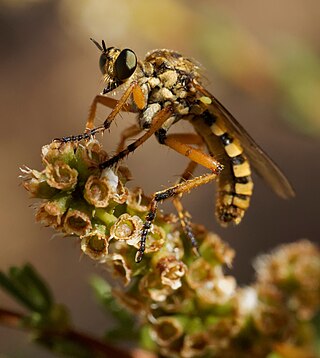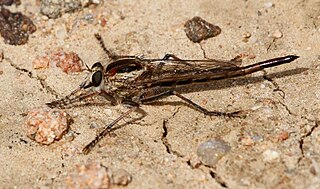
The Asilidae are the robber fly family, also called assassin flies. They are powerfully built, bristly flies with a short, stout proboscis enclosing the sharp, sucking hypopharynx. The name "robber flies" reflects their expert predatory habits; they feed mainly or exclusively on other insects and, as a rule, they wait in ambush and catch their prey in flight.

The Therevidae are a family of flies of the superfamily Asiloidea commonly known as stiletto flies. The family contains about 1,600 described species worldwide, most diverse in arid and semiarid regions with sandy soils. The larvae are predators of insect larvae in soil.

Dasypogoninae is a subfamily of robber flies in the family Asilidae. There are more than 60 genera and 520 described species in Dasypogoninae.
Bongolo Dam, is located on the Komani River, near Queenstown, Eastern Cape, South Africa. The dam has a capacity of 7,015,000 cubic metres (247,700,000 cu ft). The Bongolo Dam, about 5 kilometres (3.1 mi) from town on the Dordrecht road, is one of Queenstown's main sources of water, its main purpose is for industrial and municipal usage. The wall was begun in 1905 and was for years the largest concrete dam wall in South Africa. Incidentally the origin of the name Bongola has caused some controversy, but it is believed by some to have been derived from the Xhosa language word mbongolo meaning donkey, as these animals were extensively used in the construction of the dam.

Pegesimallus is a genus of robber flies.

Laphriinae is a subfamily of robber flies in the family Asilidae. There are more than 110 genera and 1,000 described species in Laphriinae. Many are mimics of syntopic bees. Some prey on bees as adults. Larvae of the genus Hyperechia are known to grow inside the cells of Xylocopa bees, feeding on their larvae.

Stenopogoninae is a subfamily of robber flies in the family Asilidae. There are more than 70 genera and 740 described species in Stenopogoninae.

Alcimus is a genus of flies in the family Asilidae, the robber flies and assassin flies. There are about 26 species which are native to the Afrotropics.
Bana is a genus of robber flies in the family Asilidae, found in southern Africa. There are at least two described species in Bana.

Stichopogoninae is a subfamily of robber flies in the family Asilidae. There are about 14 genera and at least 230 described species in Stichopogoninae.

Choerades marginata is a species of robber fly found in Europe.

Laphyctis is a genus of robberflies restricted to the Afrotropical region. In the past some members were placed in the genus LaphystiaLoew, 1847. Laphyctis has an open R1 cell unlike Laphystia and has long dense macroseta on the distal margin of the male gonocoxite. Most species in the genus are found in dry sandy regions and are active in summer.

Afromosia barkemeyeri is a species of robber fly, the sole member of the genus Afromosia. The specific epithet honours Dr Werner Barkemeyer.










